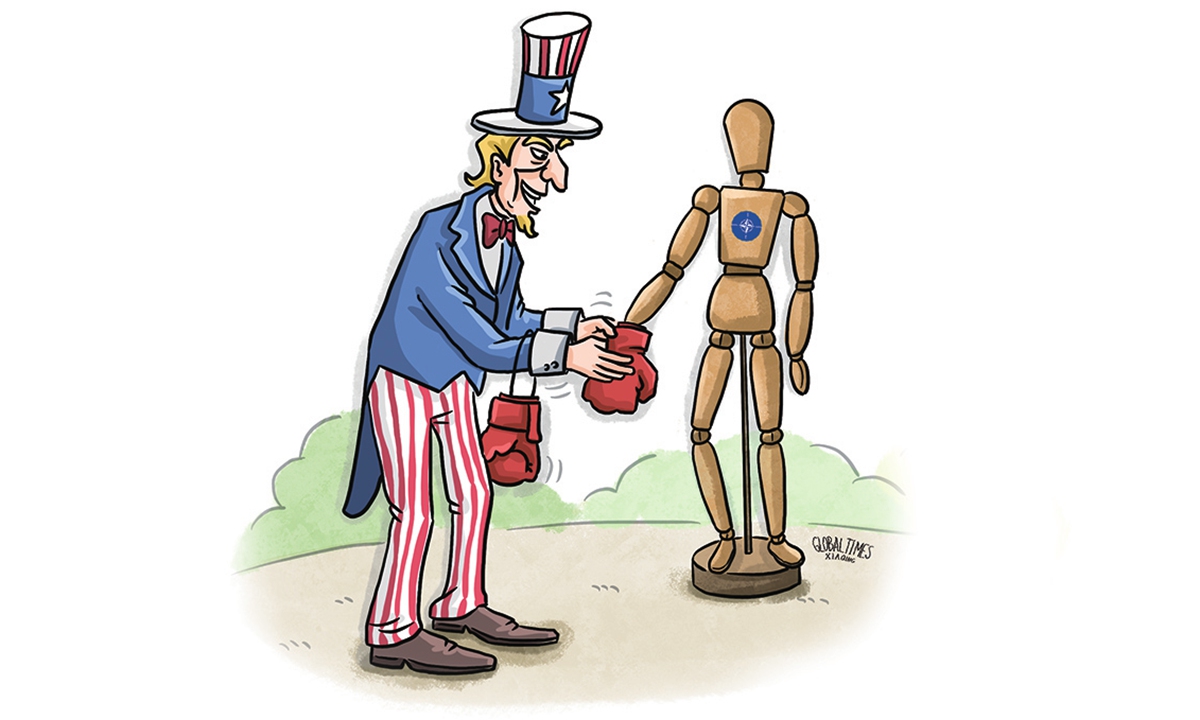
Illustration: Xia Qing/GT
US President Joe Biden will be heading to Europe for a three-country trip from July 9 to 13. Destinations include the UK, Lithuania, and Finland. Since assuming office, Biden has frequently visited Europe as president, drawing a contrast with his predecessor Donald Trump.Unlike Trump, Biden is well aware that American hegemony is beginning to decline. He understands that it is difficult to maintain US dominance in the world solely through the US' own efforts. Therefore, he has adopted a multilateralist foreign policy, which means consolidating alliances. In order to repair the damaged relationship between the US and Europe, Biden declared "America is back" as soon as he took office in an attempt to re-boost the transatlantic alliance. In order to keep Europe on the US' side, Biden has frequently visited Europe in recent years, seemingly showing goodwill to European allies and attaching importance to attending multilateral conferences of G7 and NATO held in European countries.
After France advocated the strengthening of Europe's strategic autonomy, the Biden administration has put more effort in enhancing the US' control over NATO, and expanding NATO's political influence in Europe.
First, the Biden administration has been continuously fanning the flames of Russia-Ukraine conflict, using Ukraine as a strategic pawn against Russia and creating turmoil in Europe. As long as the conflict between Russia and Ukraine continues, the US can bind European countries on its side through NATO against Russia. Currently, this strategy seems to be effective.
Second, using NATO as leverage, the US has made its allies willingly pour money into NATO, while at the same time, jeopardizing European strategic autonomy advocated by some European countries.
Third, the US government has taken advantage of the Russia-Ukraine conflict and has become the biggest beneficiary. The conflict has dealt a heavy blow to major European countries such as Germany, causing energy shortages and rising raw material prices, which have presented great business opportunities for the US. The Biden administration has attracted advanced manufacturing enterprises from Germany, Italy, and other European countries to invest and establish factories in the US through its implementation of the Inflation Reduction Act. Through intimidation tactics, European NATO member countries have generously contributed funds and ordered military equipment from the US.
Further strengthening the US' control over NATO is also reflected in Biden's choice to visit the UK first. The move is aimed to appease the UK and demonstrate the "special relationship" between the two. As the UK is the most loyal ally of the US in Europe, US presidents frequently visit London, putting on a show to showcase their traditional friendship with European countries. This incoming visit by Biden to Europe is no exception. Due to France's opposition against UK Defense Secretary Ben Wallace's dream of becoming the next NATO Secretary General, the US, considering the "bigger picture of unity," chose to support France. Against the backdrop, Biden's visit to the UK before the NATO summit is also aimed at mending fences.
After taking office, Biden has repeatedly placed emphasis on the strategic importance of the US-EU alliance and NATO. His upcoming attendance at the NATO Summit in Lithuania will not only demonstrate the US' concern for its European allies but also focus on how to increase NATO's intervention in the Russia-Ukraine conflict, further weakening Russia and making more NATO's European member states obedient to the US. In addition, Biden's visit to Finland, a new NATO member, aims to make Nordic countries feel the US' attention and support and to encourage Finland play a greater strategic role in restraining Russia in the Russia-Ukraine conflict.
All these gestures clearly indicate that the Americans are well aware that without NATO and alliance diplomacy, the US is running out of its own advantages.
The author is a research fellow at the Chinese Academy of Social Sciences' Institute of European Studies. opinion@globaltimes.com.cn

